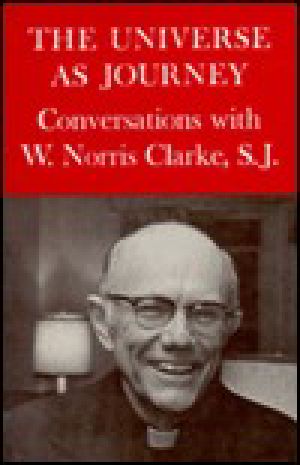The Universe as Journey · Consersations With W. Norris Clarke, S. J.

- Authors
- McCool, Gerald A.
- Publisher
- Fordham University Press
- Tags
- test
- ISBN
- 9780823212088
- Date
- 1988-01-01T00:00:00+00:00
- Size
- 0.33 MB
- Lang
- en
W. Norris Clarke's metaphysics of the universe as a journey rests on six major positions: the unrestricted dynamism of the mind, the primacy of the act of existence, the participation structure of reality, and the person, considered as both the starting point of philosophy and the source of the categories needed for a flexible contemporary metaphysics. Reflecting on his conscious life and the universe around him, the finite person mounts by a two-fold path to its Infinite source, who, though immutable in His natural being, is mutable in the intentional being of His personal knowledge and love. The personal God is the efficient cause from whom the universe comes and the final cause to whom it returns.Less optimistic than Norris Clarke, John Caputo wonders about his metaphysics of the person. In a hermeneutical interpretation of the human face, the person through whom Being soundsdiscloses an ambiguous Being that both reveals and conceals itself. Far from grounding a casual ascent to God, hermeneutical phenomenology allows us no more than the right to interpret the world and its transcendent source through our own free decision.Although impressed by Norris Clarke's attempt to introduce mutability into God, Lewis Ford still finds Clarke's Thomistic God unacceptable. As a Whiteheadian, he proposes in place of Thomas' God, whose perfection consists in static unity, a God whose perfection consists in a never-ending process of unification. John Smith argues against the traditional dichotomy made between the ontological and cosmological arguments. Rather than opposed methods of proving God's existence, they should be taken as complementary journeys to the divine presence which discloses itself, although diversely, in the soul and in the world. There are parallels between Smith's historical study of two arguments and Clarke's two-fold path to God. Yet Smith is critical of Thomas' cosmological journey to God and does not share Clarke's confidence in its validity. Significant studies in their own right, the three essays as a group challenge Clarke's whole metaphysics of the universe as a journey. Meeting the challenge, Clarke clarifies and refines his own thought.An account of Clarke's philosophy by Gerald A. McCool, S.J. preceds this unified and stimulating philosophical discussion.